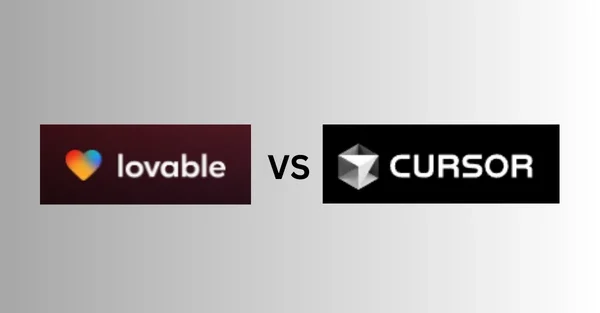
Compare Cursor and Lovable.dev in this 2025 showdown of AI coding tools. Discover features, pricing, performance, and the best use cases to choose the right platform for your next project.
In today’s landscape, software development has been dramatically transformed by AI-powered tools. Two standout platforms—Cursor and Lovable.dev—are leading this transformation, each targeting different segments of developers and creators.
Whether you’re a seasoned programmer or a startup founder with zero coding experience, this detailed comparison will help you decide which AI tool best suits your needs.
Market Positioning & Core Functionality:
Cursor has solidified its position as a developer-focused AI IDE built around the familiar VS Code interface. It’s designed for professional programmers and offers deep codebase integration, advanced AI features, and seamless workflows for individuals and teams.
On the other hand, Lovable.dev shines in the no-code and low-code arena. It allows users to build complete full-stack applications—frontend, backend, and database—just by describing them in plain English. Perfect for non-tech founders, agencies, and rapid prototypers, it’s an MVP generator that skips the learning curve.
Feature Breakdown: Cursor vs Lovable.dev
1. AI Code Assistance & Capabilities:
| Feature | Cursor | Lovable.dev |
|---|---|---|
| Code Generation | Multi-file support, Claude 3.5 Sonnet-powered suggestions | React + Supabase app generation in under 5 minutes |
| Context Awareness | Codebase-wide semantic search, @codebase AI queries | Prompt-only logic, lacks live code analysis |
| Editing Tools | Inline AI refactoring, terminal and diff view integration | Manual GitHub edits, no built-in refactoring tools |
Cursor is ideal for managing large, complex projects with live code analysis, while Lovable.dev offers blazing-fast app scaffolding ideal for launching MVPs and prototypes.
2.Performance Metrics:
Cursor:
Speed: Suggestions in under 200ms
Accuracy: 98% reliable for popular frameworks like React and Node.js
Limits: Claude-based suggestions are quota-limited on Pro plans
Lovable.dev:
Speed: App generation in 2–7 minutes
Code Quality: Requires manual polish for production
Scalability: “Scale1” plan supports high-traffic deployments
Technical Integration & Ecosystem:
Cursor:
Supports 15,000+ VS Code extensions
GitHub/GitLab integration with AI-assisted PR reviews
Figma-to-code conversion plugins for design sync
Lovable.dev:
Pre-integrated with React, Supabase, Stripe, and Vercel
Limited to web apps only (no mobile or native support)
Offers community templates for dashboards, SaaS platforms, etc.
Developers needing deep tooling integration will love Cursor. Creators seeking simplicity and structure out-of-the-box will prefer Lovable.dev.
Pricing and Accessibility:
| Plan | Cursor | Lovable.dev |
|---|---|---|
| Free Tier | Basic code completions | 5 prompts/day |
| Pro Plan | $20/user/month | $20/month (unlimited generations) |
| Enterprise | $40/user/month (Claude quota) | Custom pricing for agencies and teams |
Cost Efficiency Insight:
Lovable.dev delivers more bang for your buck if you prioritize quick prototyping. Cursor’s value lies in its deep AI-powered development assistance for production-ready apps.
User Demographics & Use Cases:
Cursor Users:
65% are professional developers working in teams of 10+
Fintech firms use it for secure refactoring and code optimization
Lovable.dev Users:
Non-tech founders build MVPs in just 48 hours
Agencies create dashboards and admin panels without writing backend code
Supported 2025 Development Trends:
AI-Paired Programming: Cursor’s agent mode automates 30–40% of boilerplate code.
Prompt-Driven Development: Lovable.dev enables 70% faster prototyping over traditional no-code tools.
Security: Cursor scans for vulnerabilities in generated code, while Lovable.dev leans on Supabase’s built-in security model.
Limitations & Workarounds:
Cursor has a steep learning curve for those unfamiliar with VS Code, but this can be eased through guided onboarding and customizable IDE templates, while Lovable.dev struggles with complex business logic, which users can overcome by exporting the codebase and extending it in frameworks like Next.js.
Verdict: Which Tool Is Right for You?
Choose Cursor if you need:
Fine-grained control over your code
Multi-language support (Python, Go, Rust)
Enterprise-ready features and security
Go with Lovable.dev if you want:
Fast MVP generation with zero coding
Visual UI customization
Budget-friendly app creation with hosting flexibility
Looking Ahead: What’s Next?
In 2025, both tools are evolving fast. Cursor is planning real-time collaboration features, while Lovable.dev is expanding into mobile app generation. Whether you’re coding line-by-line or building apps by describing your idea, AI tools like Cursor and Lovable.dev are democratizing software creation.






